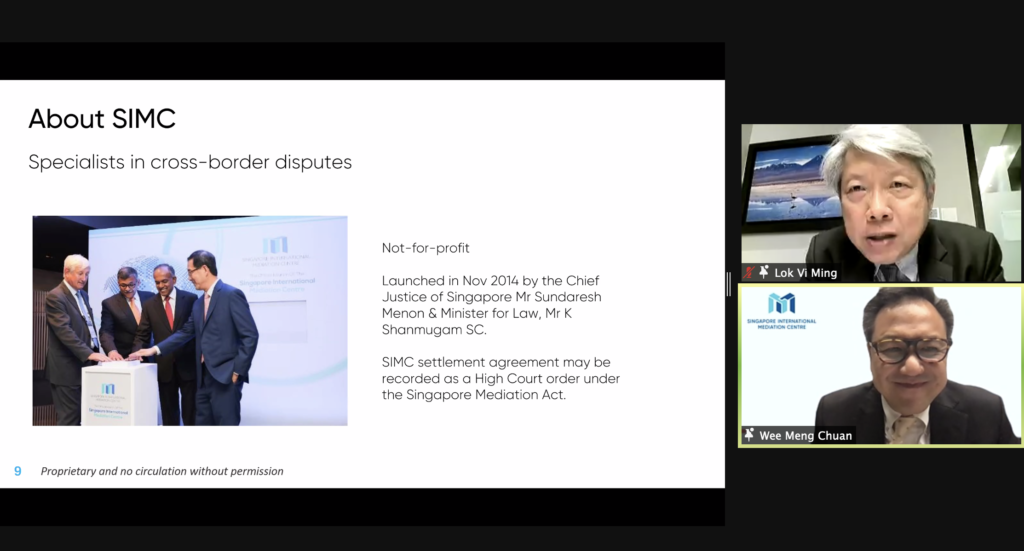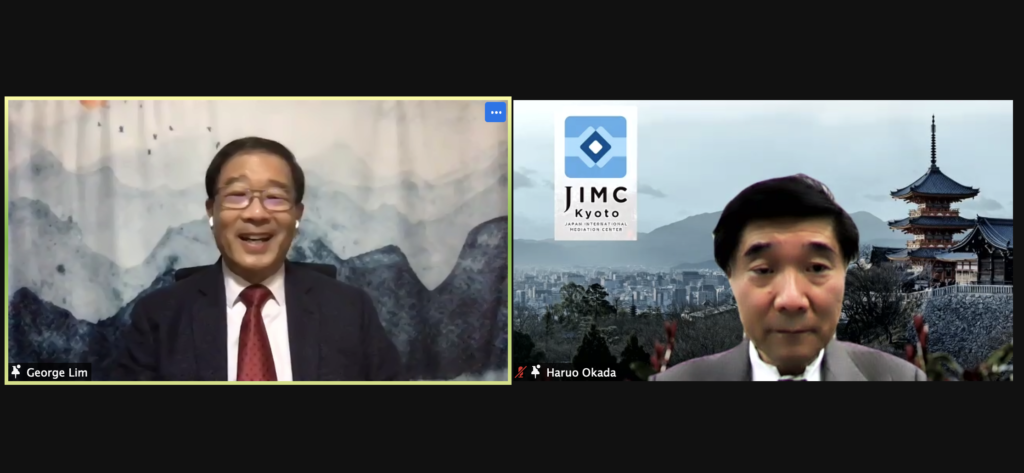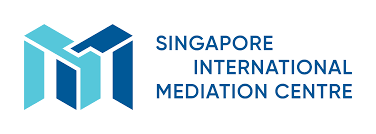JIMC-SIMC Joint Webinar: International Mediation During and After Covid-19 – Prospects of Online Mediation and its Effectiveness
A webinar jointly hosted by JIMC and SIMC took place via Zoom on the evening of 20 November 2020. Minister for Home Affairs and Minister for Law in Singapore, K. Shanmugam SC and Minister for Justice in Japan, Yoko Kamikawa as well as distinguished panellists spoke at the event.
Lectures were given by speakers from both Japan and Singapore including Mr Naoshi Takasugi, Mr Lok Vi Ming, Mr Chuan Wee Meng, Mr James Claxton, and Mr Yoshima Furuta. The session focused on the operation of the new Protocol and the entering into force of the Singapore Convention on Mediation.
The event celebrated the second anniversary of the Japan International Mediation Center (JIMC-Kyoto), and the launch of the JIMC-SIMC Joint Covid-19 Protocol. Over 200 participants tuned in to learn about the developments and adaptations of international mediation proceedings amidst Covid-19 restrictions.
In his opening remarks, Mr Akira Kawamura, President of the Japan Association of Arbitrators (JAA), highlighted that in light of the recent Regional Comprehensive Economic Partnerships (RCEP) agreement, the JIMC-SIMC Joint Covid-19 protocol was launched at an opportune time. The partnership will foster cooperation amongst legal professionals across Japan and Singapore by upholding free common society in Asia through justice and the rule of law.
The event also saw opening video messages delivered by the Minister of Justice in Japan, Yoko Kamikawa, and Minister for Home Affairs and Minister for Law in Singapore, K. Shanmugam SC, both of whom highlighted the importance of mediation to facilitate cross-border commerce and resolve disputes, particularly in a time of Covid-19.
In light of the Covid-19 pandemic, Minister of Justice in Japan, Ms Yoko Kamikawa drew attention to the advantages of international mediation in achieving speedy and forward-looking settlement of disputes. She expressed hope for Japan to lead the world in the field of dispute resolution (see here for the full speech).
Minister Kamikawa also congratulated Singapore on the entry into force of the Singapore Convention on Mediation. She stressed the central role of Japan and Singapore in dispute resolution in the region, congratulating JIMC-Kyoto on its successful launch as an important milestone in promoting international arbitration and international mediation in tandem.
Minister for Law Mr K. Shanmugam SC recognised the strong collaboration between SIMC and JIMC-Kyoto in promoting mediation for the business community in Japan. He cited the JIMC – SIMC Joint Covid-19 Protocol as an example of supporting businesses—in particular, companies along the Singapore-Japan corridor—with an economical, expedited and effective route for resolving commercial disputes amid the Covid-19 pandemic (see here for full transcript).
Predicting that commercial mediation would be more widely used, especially with the advent of the Singapore Convention on Mediation[1], which entered into force on 12 September 2020, Minister Shanmugam called on more countries, including Japan – the third largest economy in the world – to come on board to realise the full potential of the Convention, and to support companies doing cross-border work.
Online mediation is here to stay
During the webinar, experts discussed recent trends and issues in international commercial mediation, including the growing need for expedited dispute resolution processes in a time of Covid-19, and how companies may take advantage of online dispute resolution processes to resolve disputes swiftly.
SIMC CEO Mr Chuan Wee Meng elaborated on the mechanics of the JIMC-SIMC Joint Covid-19 Protocol and how it can help businesses, especially those that have been hit by the pandemic. He expressed hope that “the collaboration of this Joint Protocol will incite a deeper trust and friendship in the years to come.”
Vice Chairman of SIMC, Mr Lok Vi Ming SC also conveyed the growing popularity of successful hybrid mediations which take place both in-person and online, allowing for greater flexibility in cross-border disputes. This format makes the Joint Protocol’s telos of creating an efficient avenue for dispute resolution for international business operations possible.

SIMC CEO Mr Chuan Wee Meng (bottom) and Vice Chairman of SIMC, Mr Lok Vi Ming SC, sharing about SIMC and the JIMC-SIMC Joint Covid-19 Protocol.
JIMC-Kyoto’s Deputy Chief Director, Mr Naoshi Takasugi laid out the potential challenges of confidentiality and rapport that an online proceeding would have to tackle. However, he proceeded to ease those fears by saying that with the appropriate preparation and skilled handling of technology, those obstacles can be surmounted.
Mr James Claxton and Mr Yoshima Furuta further elaborated on the safeguards that are put in place to ensure that the integrity of the mediation format is not compromised when online. Issues of security, communication and engagement could be addressed through adapted preparations to ensure that parties have the optimum experience to focus on the dispute at hand. It may even be the case that a broader range of disputes can be mediated online, from low quantum issues to complex ones.
SIMC Chairman Mr George Lim SC and JIMC-Kyoto Chief Director Mr Haruo Okada closed the session by underlining the rapid movement towards online mediation. With users, mediators and organisations becoming accustomed to the online form, it looks like remote mediation is here to stay. Mr George Lim left us with the uplifting message that “in these difficult times, unity is more important than ever. That is why mediation is the way forward to help people resolve conflicts.”

Closing remarks were made by SIMC Chairman Mr George Lim SC and JIMC-Kyoto Chief Director Mr Haruo Okada.
Here are some selected noteworthy soundbites from the webinar
Chuan Wee Meng: “The world has changed. Even though parties may soon be able to travel, online mediation is here to stay. Some parties may even prefer this online set-up because it can be arranged more quickly and is more cost effective.”
James Claxton: “With respect to witnesses or experts, online mediation offers a great opportunity. If an expert lives on the other side of the world to where the mediation is being held, it is much easier for that expert to join if the mediation is being held online.”
Minister of Justice for Japan, Ms Yoko Kamikawa: “Japan and Singapore are strategic partners that share fundamental values. It is in the common interest of the two States to advocate for the rule of law and enhance free trade.”
Yoshima Furuta: “Through the Singapore Convention on Mediation, international mediation agreements would be made enforceable in Japan as well. There is a movement to revisit Japanese laws to align with the new Convention.”
Minister for Law in Singapore, K. Shanmugam: “The strong show of support for the Convention bears testament to multilateralism and the continued commitment of countries around the world to a rules-based international order”
Lok Vi Ming: “The Singapore Convention on Mediation addresses the problem of an unharmonised system of enforcement across different countries. The Convention provides a procedure to ensure that settlement agreements are enforceable.”
[1] 53 countries have since signed the Singapore Convention on Mediation. Six countries have ratified. The coming into force of the Singapore Convention on Mediation on 12 September 2020 allows parties to enforce settlement agreements in the jurisdictions that have ratified the Convention, including Singapore.

